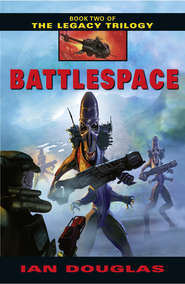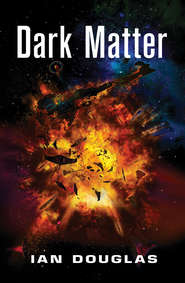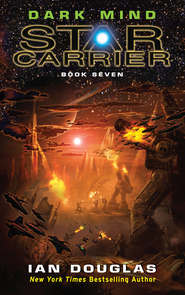По всем вопросам обращайтесь на: info@litportal.ru
(©) 2003-2024.
✖
The Complete Legacy Trilogy: Star Corps, Battlespace, Star Marines
Настройки чтения
Размер шрифта
Высота строк
Поля
“So what’s the solution, then?” the President wanted to know.
“Let ’em have their damned planet,” Voekel said. “God knows we don’t need trade with the Annies. The xeno people can study ’em from orbit.”
“Not if they have the technology to shoot a starship out of the sky,” Dahlstrom pointed out.
Voekel shrugged. “They’ve had five years to study these critters. That ought to be enough.”
“Five years,” Boland pointed out, “isn’t enough time to even begin mapping out the problem. This is a whole world, a whole culture, a history, a language, a people unlike anything we’ve ever known—”
“The fact is,” Voekel said, “we don’t need these Annie jokers nearly as much as they need us. And starships are damn expensive. I just think we ought to take a real careful look at what we have invested here, before sending any more of our assets out there to Llalande.”
“Are you saying we should call off Operation Spirit of Humankind?” Haslett asked. He pursed his lips, a sardonic acknowledgment of the pretentiousness of the cumbersome title. “At this late date?”
“What’s late?” Voekel asked. “The ships haven’t launched yet. The relief force hasn’t even been assembled. We could call the whole thing off this afternoon. Damn it, I say we should call it off. The cost—the risk—it’s just not worth it.”
“Which means we write off our people on Ishtar,” Admiral Knudson said. “Unacceptable. Absolutely unacceptable!”
“Karl may be right,” Thomas Wright, the Secretary of Human Affairs, said. “The cost of each interstellar expedition is … quite literally astronomical.” He chuckled at his own wit. “Attempting to enforce our political will on aliens is lunacy at best. DepHA regrets the loss of life, of course, but I remind you that we advised against the original involvement at Llalande when contact was first established ten years ago. The Ahannu are primitives and no longer understand those fragments of advanced technology they still possess. It’s not as though they can teach us anything, right?” He made an unpleasant face. “As for the xenohistorical crap, that’s been out of control since First Contact and the Genesis Awareness. I don’t think anyone really understands the Frogs or what they supposedly did on Earth thousands of years ago. I don’t think we need to. It’s all moot.”
“We’d damned well better understand them, Mr. Wright,” Van Horne said, her voice sharp, “if we’re going to understand the psychoreligious mania that’s infected the American population over the past few decades.”
That, Haslett thought, was certainly true. The knowledge that aliens, the ancestors of the Ahannu, had colonized Earth over ten thousand years earlier, enslaving the human inhabitants of the Fertile Crescent, had struck humankind’s collective awareness like a thunderbolt. The idea that those aliens had actually tinkered with the human genome, somehow been responsible for what humans were like today … that bit of information had utterly and forever transformed the way man would look at himself.
“Just the American population?” Billingsworth asked with a wry grin. “Whether people think they’re gods, devils, or alien slave raiders, the whole damned world has gone nuts over the Ahannu, one way or another.”
“Be that as it may,” Voekel said, “certain inescapable facts remain. We cannot support a major military operation at interstellar distances against the determined resistance of an entire planetary population. Further, there is no compelling reason to do so. The loss of our people already in the Llalande system is regrettable, certainly, but we must recognize and accept that even if some have survived the debacle at Ishtar, ten years is a long time. There will be no survivors by the time the Derna and her support group arrives in the Llalande system.”
“Madam President,” Admiral Knudson said, turning to face the woman at the head of the table. “The voters will never forgive a … a betrayal of this magnitude! We must at least attempt to relieve the Llalande mission. Anything less would be criminal!”
“Sending more people after them to die would be stupid,” Voekel said. “If military history teaches us anything it’s that we should know when to cut our losses and get out.”
“There’s more to it than that,” the President said. “There are … certain political considerations that must be taken into account.”
“Aren’t there always?” Billingsworth asked with a wry twist to his mouth.
“It’s this issue of human slaves on Ishtar,” the President continued. “The people are up in arms. Protests. Demonstrations. Marches. Riots, even. Some pro-An, of course, mostly the religious groups, but the worst are the anti-An movements. More and more groups are appearing everywhere now, here and in other countries too. The Human Dignity League. The Earth First Coalition. The Humankind Abolitionist Union. I’ve never known any issue to unite so many people from so many countries across so much of the entire globe!”
Again Haslett had to agree. Descendants of human slaves taken by the An to the Llalande system ten thousand years ago now numbered anywhere from hundreds of thousands to millions—no one was sure how many there were—and their bondage had become a rallying point for all of the anti-An groups on Earth.
“And the violence is completely out of hand,” President LaSalle continued. “That riot in New Chicago a couple of weeks ago … what was the final tally on that?”
“Fifty-one killed, Madam President,” an aide with an open cerebralink seated just behind him said, a vacant expression on his face as he pulled the requested data down off the White House AI-Data Net. “Over three hundred injured. Perhaps 800 million in property damage.”
“Fifty-one killed,” President LaSalle repeated, shaking her head. “And there have been riots all over. Here in Washington. Detroit. Los Angeles. New Miami. And in other countries too. Johannesburg. Rome. Kiev. Madrid. Rio. The people want those human slaves on Ishtar—these Saguras—they want them free. If we abandon the planet, it’s going to count heavily against us in the congressional elections this year and even worse in the presidential election in ’forty.”
“Madam President,” Voekel said, “surely we can’t base our policy—our military policy—on a world eight light-years away, on the antics of a few damned malcontents!”
“General, those ‘few damned malcontents,’ as you call them, pull a hell of a lot of political weight. You know how unsettled things have been all over the world since the discovery of human slaves on Ishtar. If we back out now, if we abandon the relief mission, we could conceivably find ourselves facing civil unrest at home and a shooting war with the rest of the Federation. I will not be the President who signs that order!”
The men and women gathered at the table were silent for a moment. General Haslett finally spoke. “General Colby? You’ve said nothing so far. They’re your Marines. What do you think?”
General Anton Colby, Commandant of the U.S. Marines, shook his head gravely. “The Marines go where they’re told to, General. For the record, I am opposed completely to abandoning our people on Ishtar, but you all knew that already.” There were a few subdued chuckles from around the table.
“With the situation on Ishtar,” Colby continued, “we are faced with a strategic problem unlike anything we have faced before. As General Voekel pointed out, the battlefield is so far away that the tactical situation is likely to have changed beyond recognition by the time our boys and girls get there. The length of the deployment is such that we will need to use a specially derived and trained unit, one without close family ties to home. By the time they return to Earth, everyone they know will have aged twenty years at least, while they will have aged only months … depending on the rho-delta-tau and the efficiency of the onboard hibertechnic equipment.
“Gentlemen … ladies … Madam President … there is an old saying in the Corps, one dating from the first half of the twentieth century. ‘Send in the Marines.’ That saying was a reflection of the Corps’ flexibility and hitting power in situations where it just didn’t pay to declare war and send in the entire army, but where military might or the threat of an all-out war was necessary to achieve the President’s goals, whatever they might be.
“The Marine Interstellar Expeditionary Unit will have the training and the hardware necessary to rescue our mission in the Llalande system. If we’re too late for a rescue, well, they can secure our property there, show the folks back home that we at least goddamn tried, and if necessary send a message to the Ahannu that humans don’t take kindly to being pushed around.
“I would like to add that some eighty of the people on Ishtar are Marines serving with the Terran research mission there. The Corps does not forget its own. If the decision is made to abandon those brave men and women out there, then I am prepared to immediately tender my resignation as Commandant of the Marine Corps. A number of my staff and other senior Corps officers are prepared to take the same steps. That, Madam President, is all I have to say at this time.”
“Well spoken,” Billingsworth said. “Madam President, I must agree with General Colby. Operation Spirit of Humankind must go on, whatever the cost in dollars or lives. We lose too much if we let the Ahannu scare us off.”
“This council is not a democracy,” the President said, her voice cold. “There will be no vote. The decision rests entirely with me.”
“Ah, and with Congress, Madam President,” the Secretary of Human Affairs said. “We can’t forget Congress. They’re paying the bill, after all, and have the responsibility to declare war.”
“You needn’t remind me, Tom,” she told him. “And you needn’t worry. Congress will declare war when I ask them to. They’re the ones whipping up all of these anti-An resolutions lately, remember. It’s good political capital for the folks back home.”
“An interesting public relations problem there, Madam President,” Haslett said. “We declare war, but it will be ten years before our strike force reaches the target. Do you think Congress, or the public, will still be interested in fighting this war in 2148? A decade is a long time in politics and in the public’s memory.”
“Frankly, General Haslett,” the President said, “that will be my successor’s problem, not mine.” She chuckled. “I plan to win my second term in ’forty, retire with dignity in ’forty-four, and be safely ensconced as an elder statesperson teaching metapolitical law on the WorldNet by the time our people even get to the Llalande system.”
“But that also means, Madam President, that your successor, or the next Congress, might not want to continue paying for a war that we started. Our troops could find themselves eight light-years from home with no hope of further reinforcements or supply.”
“Then the Joint Chiefs and the Federal Military Command will just have to see to it that we win with the one expeditionary force, won’t they?”
Haslett nodded but felt deep reservations. This unexpected Ahannu god-weapon that could shoot starships from the Ishtaran sky … it was disturbing, even frightening. If the transport Derna was destroyed while the Marines were on the ground, they would have no way home, no matter what provisions Earthside Command made in advance. And Haslett was politician enough to know that the public wasn’t likely to support another expensive mission to Llalande to rescue the first two, no matter how up in arms they were at the moment over the Ahannu’s human slaves.
General Haslett glanced across the table at Colby and wondered what the Marine commandant was thinking.
The Mall
Washington, D.C., Earth
1840 hours ET
Secretary of State David Randolph Billingsworth rarely visited what he thought of as the tourist city. The special government service maglev subway generally whisked him straight from the underlevels of the White House–Executive Building complex to the station less than a block from his suburban Bethesda home, so his only glimpses of downtown Washington were through the odd window or on the big wallscreen in his office. The coded message that had come through on his cerebralink’s priority comm channel had been as explicit as it had been terse, however. He’d checked a robot floater out of the Executive Office motor pool and ridden six blocks to the Fourteenth Street entrance of the Mall Dome, right next to the Smithsonian Museum of American History.
The Dome, actually a long, narrow ellipsoidal geodesic, stretched from the foot of Capitol Hill almost to the base of the Washington Monument, arching high above the historic Washington Mall. The largest freestanding geodesic in the world when it was built in 2069, it was widely praised as a modern wonder of the world … and equally vilified as a monumental eyesore in the City of Monuments.
Billingsworth had no feeling about it one way or another. It was possible for him to get anywhere within the government office warrens by maglev, from the Pentagon to the Capitol Building to Central Intelligence at Langley to the White House, so he never needed to go up on the surface and actually see the thing. But he had to admit it was rather pleasant … a cool escape from the heat and humidity of midsummer D.C., with late afternoon sunlight filtering through the transparencies to the west, from behind the slender dark spike of the Washington Monument.
He took a seat on a park bench next to a riot of forsythia. Tourists strolled or hurried past on the walkway or slid silently along on the glidepath. A naked couple snuggled on a blanket on a hillock nearby. A young woman—a congressional aide, perhaps—jogged past with a determined gait, her head completely enclosed in a sensory overlay helm, wearing nothing else but a sports bra and shoes. Near the Mall entryway, a gaggle of teenagers resplendent in iridescent Ahannu scale tattoos and shaven heads were passing out pro-An vidfliers to any who would take them.
No one seemed to recognize him, and that was good. He’d considered wearing an overlay helm himself … but that would have broadcast his ID out to anyone else with the requisite electronics and an unhealthy curiosity. Besides, people knew the President … but how many knew what the SecState looked like or even what his name was?
“Mr. Billingsworth?”











